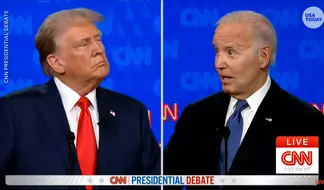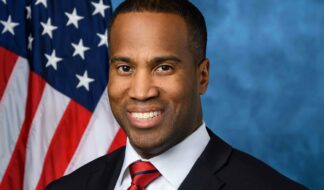By Austin Williams
Last week after Charles Pugh took a plea deal https://pridesource.com/article.html?article=78771, the victim in that case identified himself to the media. This is his own story in his own
The accusation that Charles Pugh is a sexual predator has been in the public's conscious for three years. But for the many young men he has accosted, it has gone one for much longer. It has caused multiple families heartache, cost tax payers thousands of dollars and brought up from the depths memories and pain for those of us Charles exploited and victimized.
I never thought I would turn Charles into the authorities and take him on within the legal system. I was going to deal with this by myself. I was going to hide it. Act like it never happened.
At 17 I left the state to pursue an education and thought I wouldn't have to face Charles, or his influence, ever again.
I thought I was special to Charles. After all, that's what he told me. He wanted my trust. He wanted me to feel like I had a choice in this. Then, later, he wanted me to feel shameful of what we had done. And it worked.
At 14, I did think I knew what I was doing. I thought that since I wanted to be around Charles so badly and learn what he knew about making it in life as a successful black, gay Detroiter, I had to give him what he wanted or he wouldn't want me around. I was never in a relationship with him. I worked for him, and so I looked up to him as a boss.
I had my first job when I was still a kid. I sold items from a Disney catalog and picked out soda cans from garbage bins at West Side Cubs home games. At 13, I was employed by the Detroit Golf Club as a caddie, walking in the sun for hours with bags on my back. I understood the virtue of work and the value of money. I understood that if I wanted to buy things, I had to earn them. At 14, I still held that determination to learn and grow and I was not scared to ask a local celebrity if he could help me. He could only answer yes or no. And I had always been taught that closed mouths don't get fed.
I looked up to Charles. He was a successful, black, gay man from my hometown. He held esteemed positions as a well known news personality and, later, led the city as president of the Detroit City Council. For years I never imagined I'd take him on and expose him as the child predator he really was.
The running joke around town was that Charles liked them young. It was common knowledge, something people seemed to know but never said how they knew. At 16, when I confronted him about what I had heard, asking him if he liked to have sex with underage boys, he was visibly angry. When I inquired whether he was having sex with the 17-year-old ward he had taken in because the boy's family had put him out, Charles became practically livid and denied any wrongdoing.
I believed him. I think because I wanted to believe he did not go after teen boys. I did not want to think I had been taken advantage of. I had no proof that he had engaged in sex with anyone else underage, and I didn't want to be known as the kid who had sex with Charles Pugh.
I hoped my situation had been unique. I didn't think he wouldn't risk his career by having sex with young boys. In my head, I allowed him a pass because he was Detroit's first representation of a successful black gay man. I gave him a pass because I believed if Charles liked me, he would teach me the lessons I needed to know to become a successful black gay male myself. He would teach me how to move in a world that did not like me based on who I was.
I worked for Charles. Just like if you hire a neighborhood teen to cut your lawn and trim your bushes or clean out your garage. Charles had my mother's permission to take me on work assignments and to employ me as, basically, a gopher. Did my mother know he was gay? Not until he came out publicly in 2004. At that point, she promptly forbade me from having contact with him.
Did I listen? Well, did you do everything your parents told you to as a teenager? I didn't either.
My parents were not at fault in any way for what happened to me. They did what they believed was right with the information they had. I continued to see Charles infrequently until the point in my teenage life that I realized I was being used and could not change our dynamic. Eventually, I cut off all communication with him for many years.
Then, in 2013, the proof of who Charles really was and the way he really thought was shown to me and all of Detroit in the text messages revealed by the media. When Khody Sanford came forward, Charles stepped back. And he ran — right out of the state.
Suddenly, it was obvious to me that Charles preyed upon Khody while he was still a senior in high school. It became clear that he did this on a regular basis, enticing young men with whatever they really needed in exchange for sexual gain. I knew what Charles was and I knew what he had done to me and now at least one other. Then, as the case moved on, others came forward and I could no longer deny the truth.
So why come forward now? Well, I am not ashamed anymore to share my experience — not if it keeps others from being manipulated by him or others like him. I truly believe it was the right thing to do. I have been living my life with a new perspective. I am trying to actually be the change I want to see, and that means speaking out. It means doing right in the face of wrong.
It means protecting my community from a predator that shows no remorse and no regret for the damage he has done. It means letting the world know that Charles is a sexual predator and that he has, without a doubt, preyed on many young black gay men in the city of Detroit. It was vital for me to ensure the physical and mental safety of my young black gay brothers growing into adulthood in Detroit, New York, Atlanta or wherever else he may have ended up. It was only right to bring some sort of justice for the countless boys Charles had sexually exploited and to those he would likely do the same to in the future.
This, I believe, is what community policing is. This is how we protect ourselves and neighborhoods — by speaking out against injustices when we see them. By speaking up and breaking the silence of shame, the silence of neglect, the silence of self-hate and deception, we are helping our own communities and growing social trust with one another. This is how we bring the crime rate in our communities down, by speaking out against those that commit them. This is how we come together as a community, by trusting that we care about each other's lives and that it's not just every person for themselves.
So that's the answer to the question I've been asked a lot since I came forward last week. That's why I took on Charles Pugh: because somebody had to. And now, finally, I was strong enough to be that someone.









